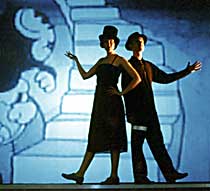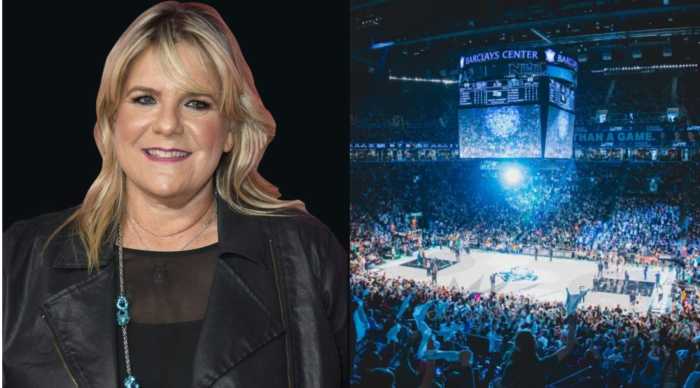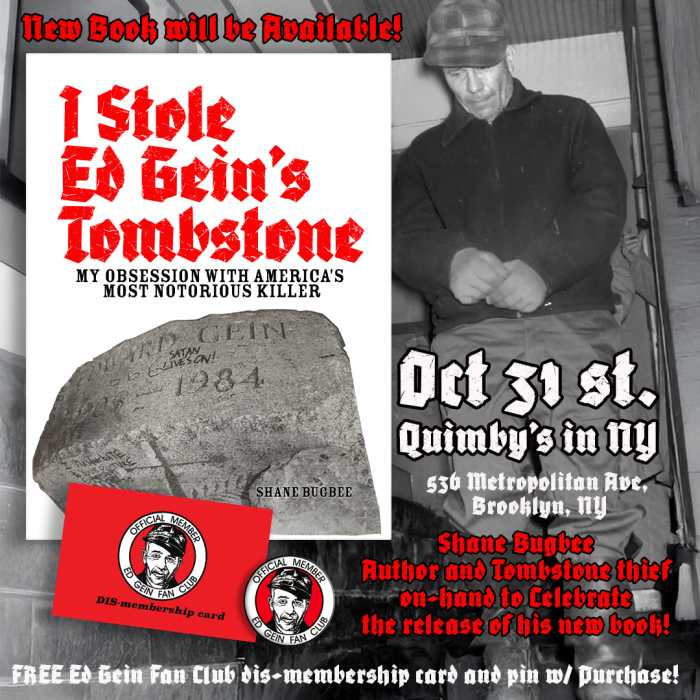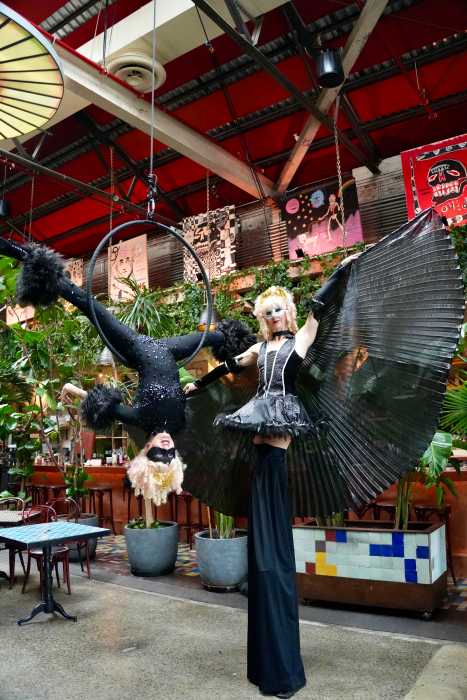"Guys and Dolls" is the kind
of musical the words, "They don’t make ’em like that anymore"
seem to have been penned for. Based on Damon Runyon’s short stories
about gamblers, gangsters and their long-suffering girlfriends,
the musical features music and lyrics by Frank Loesser and a
book by Jo Swerling and Abe Burrows.
The show opened at the 46th Street Theatre on Nov. 24, 1950 and
ran for 1,200 performances. It was directed by George S. Kaufman
and starred Robert Alda as Sky Masterson, the gambler who can’t
resist a bet and ends up losing his heart; Isabel Bigley as Sarah
Brown, the Salvation Army missionary who captures his heart;
Sam Levene as Nathan Detroit, proprietor of "the oldest
established permanent floating crap game in New York"; Vivian
Blaine as Miss Adelaide, the cabaret singer who has been Detroit’s
fiance for 14 years; and Stubby Kaye as Nicely-Nicely Johnson
whose "Sit Down, You’re Rockin’ the Boat" rocked the
stage.
"Guys and Dolls" was revived on Broadway with an all-black
cast in 1976 and again in 1992 in a production directed by Jerry
Zaks with Nathan Lane as Nathan Detroit and Faith Prince as Miss
Adelaide. The play has also been a perennial favorite of local
theater companies.
This season, Narrows Community Theater in Bay Ridge, in collaboration
with the Our Lady of Angels Theater Group, has joined the crowd
with a rousing production worthy of attention and admiration.
The production is directed by Betty Kash ("Arsenic and Old
Lace," "Gypsy") and stars John Hefferman as Sky
Masterson, the handsome, man-about-town who one day wagers that
he can convince any woman to accompany him to Havana the following
evening. That woman turns out to be Sarah Brown of the Save-a-Soul
Mission, who is played by the pert, powerfully voiced Eileen
Christensen (Mama Rose in last season’s "Gypsy.")
Hefferman has the easy grace and ironic sentimentality essential
to the role. He also has a fine lyric voice, perfect for songs
like "I’ve Never Been in Love Before" and "I’ll
know" and also for winning over the idealistic and susceptible
Christensen.
Masterson’s cohorts have names like Harry the Horse (Rob Misciagna),
Angie the Ox (Fred Milani), Society Max (James Gallagher), Liver
Lips Louie (Paul Laddomada), Kid Romeo (John Salvio III) and,
last but not least, Nicely-Nicely Johnson (the Stubby Kaye lookalike
Frank Surdi). His most menacing foe is Big Julie (John Nersten),
a pistol-toting thug from Chicago who makes up his own rules
as the game progresses and plays craps with blank dice so he
can make the calls from memory.
Masterson’s best friend is Nathan Detroit (Rob Fahn), whose infatuation
with gambling has somehow not prevented him from falling in love
with the nasally challenged Miss Adelaide (Liz Kash Stroppel)
a truly lovesick cabaret singer who has been reduced to writing
her mother letters that picture Detroit as the assistant manager
at the A&P and the father of five.
Fahn and Stroppel are a fine comic team in their verbal and tuneful
sparring in "Sue Me," and equally entertaining when
they’re apart on their own turf – Fahn singing with his gambling
pals in "The Oldest Established" and Stroppel in her
sneeze-riddled "Lament" and with her Hot Box Girls
in "Take Back Your Mink."
Mickey Sullivan as Arvide Abernathy, Sarah’s mentor and fellow
missionary, and David Forsyth as the unrelenting Lt. Brannigan
are particularly effective in supporting roles.
Terrence Caufield has choreographed some ambitious dance numbers
– the Latin-beat "Havana," the chorus line in "Take
Back Your Mink," and the tense and jazzy "Luck Be a
Lady." And Surdi does jubilant justice to the pseudo-gospel
"Sit Down, You’re Rockin’ the Boat."
"Guys and Dolls," with its overabundance of hum-able,
sing-able and unforgettable songs; its colorful characters with
their peculiar pronunciations and idiomatic language; and it’s
improbable but endearing plot has everything one could want in
a musical.
Narrows Community Theater and Our Lady of Angels Theater Group
have produced a winner. If you get to see it, you’ll be in luck.
Exemplary ’Xtravaganza’
Since its founding in 1994, The Builders Association has earned
a reputation as a theater company whose projects combine live
performance and electronic media in new and innovative ways.
In past productions, the company has used current techniques
and technology to interpret traditional work – "Master Builder"
(1994), "Imperial Motel (Faust)" (1996) and "Jump
Cut (Faust)" (1997).
The company’s latest production, now playing at St. Ann’s Warehouse
in DUMBO, does something new. "Xtravaganza," subtitled
"Ten Acts Displayed with Moving Pictures," explores
the very nature and development of multimedia.
Since its debut in October in its new home, Arts at St. Ann’s
has flourished as a home of the new and experimental in the heart
of DUMBO, welcoming such companies as the Wooster Group, Clear
Channel Entertainment and Kim Whitener as producing partners.
Future collaborations include "Labapalooza! Mini Festival
of New Puppet Theater" from The Lab (May) and "Bill
Frisell: Mysterio Simpatico" (June).
If multimedia theater came to dominate a good deal of theater
beginning in the 1960s, its foundations were laid much earlier
with the extravaganzas of the mid-19th and early-20th centuries.
These spectacles mixed live performance, music, dance and later,
film.
They were pioneered in the pageantry of Steele MacKaye, who presented
William F. Cody’s "Buffalo Bill’s Wild West Show" indoors
for the first time at Madison Square Garden; Loie Fuller the
"magician of light," who manipulated folds of silk
through shimmering beams of colored light; the incredibly lavish
and imaginative staging of Florenz Ziegfeld, best known for his
Ziegfeld Follies; and the innovative cinematography of Busby
Berkeley, who almost single-handedly created the genre of musical
comedy on film.
In 10 episodes, "Xtravaganza" director Marianne Weems
dissects and displays the contributions of these four theater
giants, blending archival film footage, sound effects, music
and live performance, using much of the technology of DJ and
VJ culture.
"Xtravaganza" features a cast of six talented actors
– Aimee Guillot, Moe Angelos, Brahms "Bravo" La Fortune,
Peter Jacobs, Heaven Phillips and Jeff Webster – who dance, act
and sing. But it is really technology that is the star here.
Like the Cubists in painting, this production deconstructs film
and theater into its pre-production parts, then reconstructs
the spectacle while retaining all its various perspectives on
sound and sight. Thus the audience sees the filming and the film,
and hears the recording of and the recorded sound, all at the
same time. In more technical terms, with the help of video cameras
and computers, scenes are introduced acoustically and re-mixed
electronically.
The audience sees MacKaye presenting "Buffalo Bill’s Wild
West Show," the rise of Flo Ziegfeld, La Loie at the Paris
Exhibition of 1900 and Busby Berkeley’s 1930 debut in Hollywood
and decline in Los Angeles (1943). Episodes are interspersed
with acts – "Loie Fuller Dance," "Ziegfeld’s Kaleidoscope
Dance" and the "Kaleidoscope Dance" re-mixed and
transformed into a Berkeley spectacle.
The result is amusing, ironic and startling. It also manages
to be moving.
The stock market crash destroys MacKaye’s dream of creating a
huge 12,000-seat theater, the Spectatorium, where he planned
to combine all the arts of theater beginning with "The World
Finder," a pageant with Christopher Columbus as its central
figure.
Depressed and out of work, Berkeley slashes his wrists and throat.
"Xtravaganza" offers a kind of behind-the-scenes look
that demystifies as it deconstructs, and the result is fascinating.
Somber triumph at Impact
"Come Back Little Sheba" was William Inge’s first play,
produced on Broadway in 1950. It was warmly received by critics,
who prophesized that Inge would one day take his place alongside
Tennessee Williams and Arthur Miller.
Although his subsequent plays – "Picnic" (1951), "Bus
Stop" (1955) and "The Dark at the Top of the Stairs"
(1957) – made a notable impact Inge never met those expectations.
Alcoholic and depressed, he committed suicide in 1973.
"Come Back Little Sheba" enjoyed a revival at Impact
Theatre, 190 Underhill Ave., through April 28, in an excellent
production directed by Ted Mornel. But boy was it a depressing
evening of theater.
Don’t get me wrong. Mornel is more than capable and the actors
were almost uniformly superb. Rather it was precisely because
the production so faithfully recreated the desperate, hopeless
condition of the characters that the play was such a downer.
Lola (Ann Saxman) a frumpy, almost middle-aged woman, and her
husband Doc (Dunsten J. Cormack), an alcoholic sometimes called
"Daddy," although he is neither a doctor nor a father,
married young because Lola was pregnant. Their relationship is
edgy because Doc has been dry for a year, and they’re both hoping
he can stick to his resolve.
When the amorous adventures of their boarder, Marie (Kimberly
Tee Breiland) bring to light their own stale lives, Doc falls
off the wagon and their relationship descends into violence and
abuse. In the meantime, an unseen presence casts its shadow over
the action of the play – Sheba, the runaway puppy that Lola had
loved like their child, who never lived to grow up.
The production showcased so much excellent acting it’s hard to
know where to begin.
Cormack was perfect in both his contained and released rage.
He knows how to make a lifeless voice brim with emotion. He made
Doc’s burden of grief weighty with every gesture.
Saxman gives such a sensitive and nuanced performance it seems
almost petty to point out that she’s much too old for the part.
When she tells Doc she’s almost 40, more than one eyebrow should
go up in the audience. But once the disbelief has been suspended,
watching Saxman perform is a pure joy.
Washed out, washed up, Saxman’s Lola still clings to life desperately
– reaching out to the mailman (Earl Fries), the milkman (Walter
DeForest), and Marie, along with her boyfriends – the churlish
Turk (Vincent Kole) and the only slightly less obnoxious Bruce
(Gary Widlund).
Breiland giggles her way from kitchen to dining room to bedroom,
her lips smiling, her hips swaying, she’s a temptress whose motives
remain deliciously ambiguous.
Even the supporting actors are impressive – Fries with his awkward
goodwill, DeForest as the not-too-bright strongman, Kole and
Widlund in the difficult roles of totally unsympathetic boors,
and Irene Shea as Mrs. Coffman, the kindly neighbor.
But, as always, there can be too much of a good thing. "Come
Back Little Sheba" runs for well over two hours – which
hardly seems necessary when the film only runs for 95 minutes.
It’s easy to see how both director and actors worked hard to
make the most of every line and every pause between the lines.
But after a while patience wears thin – even for the best of
performances. Mornel needed to get his actors to speak and respond
more quickly, and have faith that the audience would get the
message anyway.
On Broadway, "Come Back Little Sheba" featured Tony
Award-winning performances by Shirley Booth and Sidney Blackmer.
But the show only ran for 190 performances, even after the cast
and playwright kept it open by taking pay and royalty cuts.
Two years later, Booth won an Academy Award for her portrayal
of Lola in the film version, adapted by Ketti Frings with Burt
Lancaster in the role of Doc.
With its meaty roles, "Come Back Little Sheba" is clearly
an actor’s play. It’s the perfect vehicle to establish or maintain
a reputation. Indeed these three equity actors – Cormack, Saxman
and Fries – have certainly proven theirs.
"Guys and Dolls" plays through
May 5, Friday and Saturday at 8 pm, Sunday at 3 pm at Our Lady
of Angels Auditorium (74th Street between Third and Fourth avenues).
Tickets are $15 adults, $10 seniors and children under 12. Parking
is available. For reservations, call (718) 482-3173, or e-mail
NCTheater@aol.com.
"Xtravaganza" plays through May 4, Tuesday through
Friday at 8 pm, and Saturday at 3 pm and 8 pm, at St. Ann’s Warehouse
(38 Water St. at Dock Street in DUMBO). Tickets are $20. For
tickets, call the St. Ann’s Warehouse, (718) 858-2424, Tuesday
through Saturday (credit card only) or visit www.ticketweb.com.
For more information about upcoming Impact Theatre Company productions,
at 190 Underhill Ave. at Sterling Place, call (718) 768-0214.

























